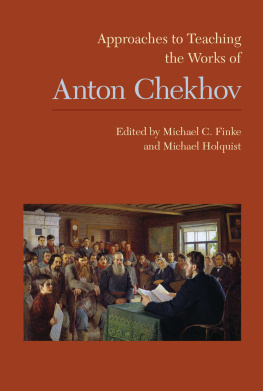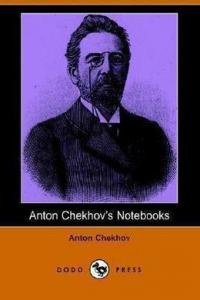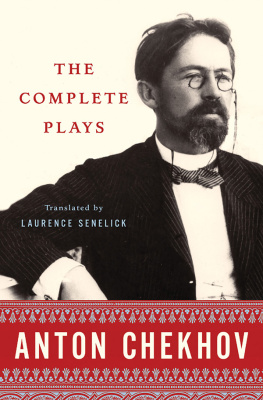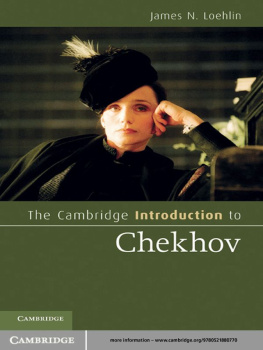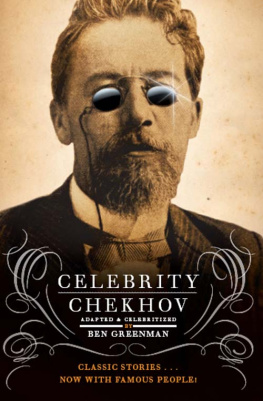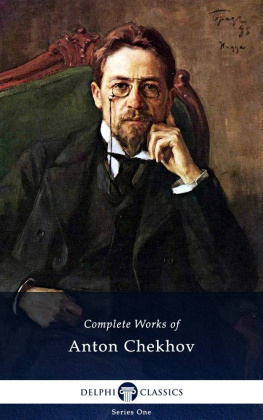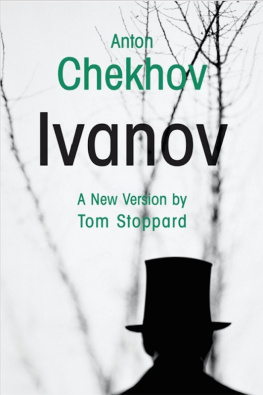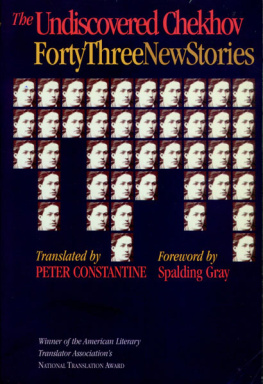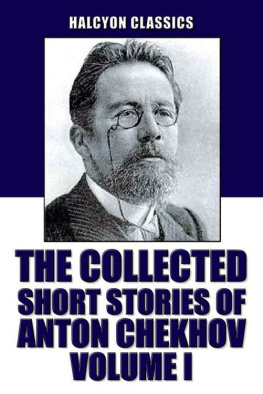Michael C. Finke (editor) - Approaches to teaching the works of Anton Chekhov
Here you can read online Michael C. Finke (editor) - Approaches to teaching the works of Anton Chekhov full text of the book (entire story) in english for free. Download pdf and epub, get meaning, cover and reviews about this ebook. year: 2016, publisher: The Modern Language Association of America, genre: Detective and thriller. Description of the work, (preface) as well as reviews are available. Best literature library LitArk.com created for fans of good reading and offers a wide selection of genres:
Romance novel
Science fiction
Adventure
Detective
Science
History
Home and family
Prose
Art
Politics
Computer
Non-fiction
Religion
Business
Children
Humor
Choose a favorite category and find really read worthwhile books. Enjoy immersion in the world of imagination, feel the emotions of the characters or learn something new for yourself, make an fascinating discovery.
- Book:Approaches to teaching the works of Anton Chekhov
- Author:
- Publisher:The Modern Language Association of America
- Genre:
- Year:2016
- Rating:5 / 5
- Favourites:Add to favourites
- Your mark:
- 100
- 1
- 2
- 3
- 4
- 5
Approaches to teaching the works of Anton Chekhov: summary, description and annotation
We offer to read an annotation, description, summary or preface (depends on what the author of the book "Approaches to teaching the works of Anton Chekhov" wrote himself). If you haven't found the necessary information about the book — write in the comments, we will try to find it.
Approaches to teaching the works of Anton Chekhov — read online for free the complete book (whole text) full work
Below is the text of the book, divided by pages. System saving the place of the last page read, allows you to conveniently read the book "Approaches to teaching the works of Anton Chekhov" online for free, without having to search again every time where you left off. Put a bookmark, and you can go to the page where you finished reading at any time.
Font size:
Interval:
Bookmark:
the Works of Anton Chekhov
World Literature
For a complete listing of titles,
see the last pages of this book.
the Works of Anton Chekhov
Edited by Michael C. Finke and Michael Holquist
The Modern Language Association of America New York 2016
CITATIONS, AND DATES
Scholars writing in American English about Russian literature and culture must choose, or find a compromise, among several standard transliteration options. The situation can become very complicated when you cite sources from languages other than English or Russian or when you use materials where no consistent transliteration method has been employed. Add to this the fundamental difference between approaching transliterated Russian names and terms with a knowledge of the language and without it: for those who do not know Russian, transliterated terms are often no easier to pronounce than the Cyrillic original.
Also, until the Russian Revolution, the Julian calendar was in use in Russia. It lagged our Gregorian calendar by twelve days in the nineteenth century and by thirteen days in the twentieth.
In order to make sure that none of our readers will be misdirected or confused, we have adopted the following conventions in this volume:
All dates will be Old Style, per the Julian calendar, unless otherwise indicated. This usage follows the standard practice in Russian scholarship.
When Russian text is cited or a Russian term discussed, especially where the sound shape or etymology of the original is relevant, we provide the Cyrillic; transliteration using J. Thomas Shaws system 2, which in essence is the Library of Congress method minus diacritics; and an English translation. Note that in the transliteration, the Russian soft sign (), in the middle or at the end of a word, is transliterated as ', not as . Although we follow Shaws system 2, common place-names and names of persons are rendered in ways conventional, familiar, and pronounceable for English-speaking readers. Citations always respect the originals from which they are taken. Therefore there will be inconsistencies in spelling: it is Chekhov as a rule, but Chekov, Tchekoff, Tchekhov, ehov, and exov may also occur.
When a Russian work is named in Russian, we provide the title in this format: transliteration (Cyrillic; translation). When the title is in italics, both transliteration and Cyrillic are italicized. In parenthetical references, only the transliteration is given.
All references to Chekhovs Russian originals are keyed to the thirty-volume scholarly edition Polnoe sobranie sochinenii i pisem ( ; Complete Collection of Works and Letters). In the parenthetical references, Sochineniia refers to the eighteen volumes of his works, and Pis'ma refers to the twelve volumes of his letters.
Citations from Chekhovs letters may be keyed to the scholarly edition or, if from a translated source, to that source. The date (unless there is no date) and addressee of the letter will be provided in every case, so as to facilitate the letters location by all users of this volume.
Because translators vary in their renderings of Chekhovs titles, we have appended a concordance of titles.
Because Chekhov has been so widely translated over the past century, and because an instructors choice of translation will vary in accordance with pedagogic purposeswhich may also involve comparing translations, as some of our author-teachers advocatewe could not insist that all contributors to this volume employ the same sources.
A daunting array of choices faces instructors teaching Chekhov in English. New renderings of his texts, including the letters and other nonfictional writings, continue to see publication, old and out-of-copyright translations abound in cheap print editions or can be read free on the Internet, and there is an ever-growing list of titles in visual media: filmed theater productions of his plays, adaptations of the plays and stories scripted for film, and amateur performances especially of the one-act plays that can be found on such venues as YouTube. Biographical approaches to Chekhov vary dramatically, with significant revisions to prior understandings gaining wide acceptance in the past twenty-five years. Meanwhile the unsophisticated researcher is vulnerable to discredited, misinformed, and factually incorrect material that remains on library shelves or, more likely, appears high on the list of Internet search results. Like most great authors, Chekhov has attracted many nonacademic commentators, biographers, and critics who, even when they are insightful, lack the language skills and research training and discipline to make their publications reliable sources. (A recent example of this unreliability is the program notes published with the BBC Video Anton Chekhov Collection, which have Chekhov writing Cherry Orchard on the island of Yalta [Program Notes].)
Instructors will want to make deliberate choices and also convey the rationale behind them this can be a teaching moment. It has become extremely difficult to ensure that all participants in a classroom are working with identical materials or, for that matter, platforms for reading them. A strategic choice must be made: either one insists on the use of one text by all, so that all will be quite literally on the same page in a lesson in close reading, or the instructor exploits differences among the translations in use or between a translation and the original. In my courses there is always a heritage or native speaker or two who prefer to read in the original and who can often help foreground questions of translation in class discussion. (Caution is advised, however: heritage speakers may have limited linguistic skills.)
What follows are selective recommendations rather than a comprehensive overview, and these recommendations are not always followed by the volumes various contributors. The editors could not insist that all the college and university instructors writing about their teaching of Chekhov refer to the same translations of his works. Chekhov has been very widely translated, but no single translator has translated his entire oeuvre. Some titles are quite difficult to find in good translations; others have been repeatedly translated, sometimes very well. The range of works treated here though still a small percentage of Chekhovs total output is broad, and the volumes contributions represent quite varying pedagogic missions. Readers should not be surprised to find, expressed in this volume, preferences that do not match the editors own.
Anton Chekhov was born on 17 January 1860 in the city of Taganrog, the third son of Pavel and Evgeniia Chekhov. His paternal grandfather had been a serf who bought his familys freedom when Chekhovs father was a teenager and managed a large estate; eventually he set Chekhovs father up as the owner of a small general store in the then prosperous port city of Taganrog, where Chekhov and his older brothers worked long hours as schoolchildren. A petty tyrant who enforced a rote and pedantic religiosity on his children, Chekhovs father went bankrupt and fled to Moscow in order to escape debtors prison. Soon the rest of the family joined him there, except for Chekhov and one of his two younger brothers, Ivan, who continued their secondary education in Taganrog. Ivan lived with relatives while Chekhov was left to fend for himself as a tutor and boarder in what had been his family home. In spring 1877, he began sending some of his earnings to his parents and siblings, thus initiating a lifelong pattern of assuming responsibility for them.
Font size:
Interval:
Bookmark:
Similar books «Approaches to teaching the works of Anton Chekhov»
Look at similar books to Approaches to teaching the works of Anton Chekhov. We have selected literature similar in name and meaning in the hope of providing readers with more options to find new, interesting, not yet read works.
Discussion, reviews of the book Approaches to teaching the works of Anton Chekhov and just readers' own opinions. Leave your comments, write what you think about the work, its meaning or the main characters. Specify what exactly you liked and what you didn't like, and why you think so.

